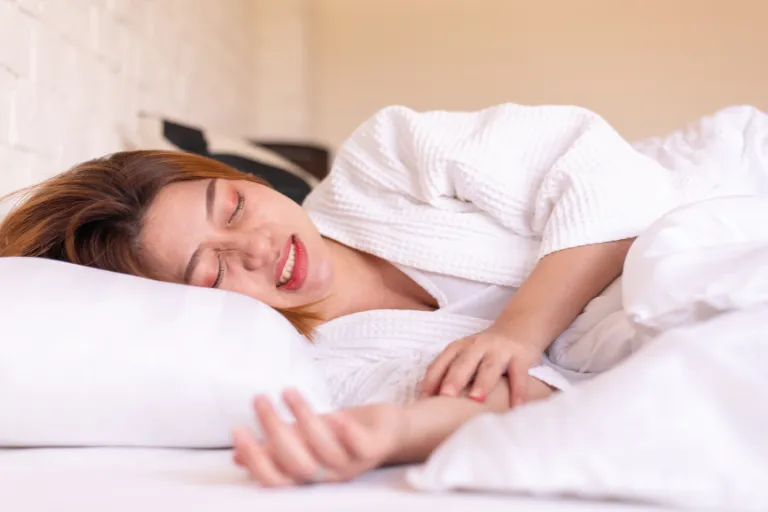Have you ever woken up with jaw pain, sensitive teeth, or a headache? You might be grinding or clenching your teeth without even knowing it. This habit is known as teeth grinding – and it can happen during the day or while you sleep.
This article explains why it happens, the signs to watch for, and how you can manage it to protect your smile and overall wellbeing.
What is Teeth Grinding?
Teeth grinding is the repeated clenching or gnashing of the teeth, or pushing the jaw forward. It happens when the jaw muscles tighten again and again, either while sleeping (sleep teeth grinding) or during the day (awake teeth grinding). Each type has its own causes.
Sleep vs. Awake Teeth Grinding
Sleep teeth grinding is common in children. It tends to occur during small wake-ups at night, which can happen several times an hour. Before each one, there is often a rise in heart rate, deeper breathing, and muscle tension – causing the teeth to grind.
Awake teeth grinding affects roughly 1 in 4 adults. It usually happens during stress and tension – marked by jaw clenching, tooth grinding or jaw thrusting. It is common during the day and not considered a movement disorder in otherwise healthy individuals. 1)
A simple first way to differentiate them is – with sleep teeth grinding, the symptoms get better as the day goes on while with awake teeth grinding, symptoms gradually get worse during the day. 3)
Who Is at Risk?
- Genetics: Teeth grinding may run in families.
- Sleep problems: It is linked to issues like sleep apnoea and restless leg syndrome. About half of adults with sleep apnoea also experience teeth grinding.
- Certain medications: Some antidepressants, antipsychotics, and stimulants may increase the risk.
- Stress also contribute to teeth grinding 1)
- Heavy alcohol use, excess caffeine, and tobacco also increase the chances of developing this habit.
What Are the Signs?
- Jaw pain or stiffness
- Wear on the teeth, cracks in the enamel
- Headaches
- Indentations along the tongue
- Restless sleep
- Daytime sleepiness
- Waking often during the night
- Trouble falling asleep
How Is It Diagnosed?
The diagnosis of teeth grinding mainly depends on careful evaluation – to look for any primary sleep disorder or other associated risk factors. 1)
1. Simple Checks
- Self reports: Many people notice the habit themselves.
- Partner observations: A bed partner might hear the grinding sounds.
- Dental examination: The dentist asks questions and examines the teeth for possible signs of teeth grinding. 3)
These checks help confirm whether teeth grinding is present, though they don’t show how severe it is.
2. Special Tests
- Polysomnography (sleep test): Often used when another sleep disorder is suspected.
- Electromyography (EMG): Measures muscle activity during sleep.
EMG combined with polysomnography is the gold standard for diagnosing sleep teeth grinding.
Sleep teeth grinding is diagnosed when:
- A person grinds or clenches teeth during sleep, and
- One or more of the following signs are present:
- Unusual tooth wear
- Jaw soreness or tiredness in the morning
- Pain at the sides of the head (temples) 1)
Management Tips
The goal is to prevent further tooth damage and ease related symptoms.
Improve Sleep Hygiene
- Avoid alcohol, caffeine, and tobacco before bed.
- Keep the bedroom cool and well-ventilated.
- Create a calming bedtime routine.
Try Relaxation Techniques
- Meditation: Deep, slow breathing calms the body and mind.
- Gentle yoga or stretches: Help reduce muscle tension.
- Relaxing music: Can ease stress and promote better sleep.
Biofeedback
A small device is placed on the skin to monitor jaw muscles. When grinding begins, it sends a gentle signal to prompt a change in behaviour.
Muscle relaxation exercises
It is significantly effective in users with pain and tiredness of the jaw muscles. It reduces pain and restores muscle and joint mobility. 4)
Mouth Guards
A custom mouth guard, made by a health professional, can protect teeth and reduce grinding.
Botulinum Toxin A Injections
Help people with severe teeth grinding by making the jaw muscle weaker. It reduces the force of grinding but does not stop grinding from happening. 1)
Conclusion
Teeth grinding is more than just a habit. It affects your teeth, jaw, sleep, and overall health. By recognising the signs early and taking simple steps, you can protect your smile and feel better overall.
Medical Disclaimer: This article has been written by a licensed health professional and is intended for general informational purposes only. It does not substitute for personalised medical advice, diagnosis, or treatment. Readers should always seek the guidance of a qualified healthcare provider with any questions regarding a medical condition or health objectives. Never ignore or delay seeking medical advice based on information presented here.
Subscribe for Free for more insightful health articles tailored to your needs.
References
- Lal, S. J., Sankari, A., & Weber, D. D. S. (2025). Teeth grinding management. StatPearls. http://www.ncbi.nlm.nih.gov/books/NBK482466/
- Mark, A. M. (2021). What is teeth grinding? Journal of the American Dental Association, 152(9), 788. https://doi.org/10.1016/j.adaj.2021.06.
- Matusz, K., et al. (2022). Common therapeutic approaches in sleep and awake teeth grinding. Neurologia i Neurochirurgia Polska, 56(6), 455–463. https://doi.org/10.5603/PJNNS.a2022.0073
- Parminder, D., & Ritu, M. (2024). Sleep teeth grinding: A review. International Journal of Health Sciences and Research, 14(8), 91–101. https://doi.org/10.52403/ijhsr.20240812



